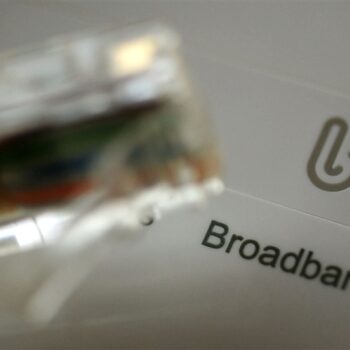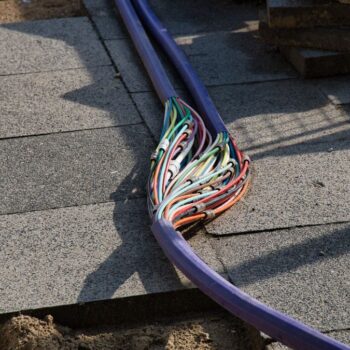If you are looking for a new fibre broadband deal in the UK, you will find that there are many different providers available with various different offers. It's a minefield - where do yu start?
Well, the first step in choosing a new fibre provider, is to determine if you actually really need it, or if you should stick with regular ADSL or 'regular broadband' as it is often called.
Currently, fibre broadband is available to roughly half of the UK population; if you're lucky enough to live in a fibre-enabled area, then great! The next step is you will need to find out whether or not fibre is available to your actual house - not just your postcode. A lot of online postcode checks will only show you providers in your postcode area, but these areas can be quite large. So make sure to check your actual home address including house number, otherwise it may lead to disappointment.
We'll discuss how to accurately check all of this below, if you are struggling then read on.
Can I get fibre broadband in my area?
If you are looking for the fastest and most reliable internet connection in the UK today, fibre broadband is probably going to be the right choice for you. It offers faster speeds than standard "ADSL" broadband, so it is ideal for households with multiple users and frequent internet usage. Those who regularly play games online and stream video will find fibre broadband particularly useful. However, you will need to consider your usage pattern before making a decision on whether fibre broadband is right for you.
Full fibre broadband is becoming more commonplace in the UK, and you can get it if your home or business is connected to a fibre cable. However, it is not available in all areas. You should contact Openreach to find out whether your area has fibre-optic connectivity. While fibre-optic speeds can be as high as 80 Mbps, the average speed for a fibre connection will still be a few Mbps lower than with an ADSL connection.
Fibre broadband tariffs in the UK differ in price. The entry-level deals will usually offer speeds between 30Mbps and 60Mbps. However, if you plan on using your broadband for gaming and streaming HD videos, you should go for a higher speed.
Do I actually NEED fibre internet?
If you are thinking about upgrading your internet connection, you're probably wondering, "Do I need fibre internet?" This type of internet is the best option for those who need reliable, high-speed internet. It can reach speeds of 1 Gbps and withstand severe weather conditions, which minimises internet outages. Plus, it allows you to connect multiple devices at once for optimal performance for any internet-related task.
Unlike standard Internet connections, fibre broadband comes straight from the source. This means it will deliver the fastest speeds and best performance. You'll get more download and upload speeds, and you'll be able to stream HD video and play games without interruptions. Moreover, fibre internet allows multiple users to connect at the same time.
Besides being faster and more reliable, fibre internet is not even that much more expensive nowadays compared with traditional ADSL. For people who want an ultra-fast connection, fibre internet is definitely worth the extra money. It works by sending pulses of light through a fibre optic cable. These pulses carry binary data (ones and zeros) which is sent via internet. Bytes are sent as eight-part patterns, and these pulses can travel up to sixty miles before degrading. During the process, they also pass through an optical amplifier to ensure no data loss.
How does fibre internet work?
Fibre internet is one of the fastest types of internet connections available. It is also the most reliable type of internet connection. However, it can be a challenge to get fibre in your area because the rollout is still ongoing in the UK. You may have to wait for 15 minutes for your service to activate. To get started, you must have a router and a SIM card.
Fibre Internet has a long track record, and is used by big companies and corporations. Fibre technology is a good choice for streaming movies and music and for fast file uploads. Furthermore, the technology does not affect distance, enabling it to handle higher data rates over greater distances. This type of internet connection is a good option for businesses or people who require the fastest speed possible.
Fibre optic cables use a process called total internal reflection to transmit light between two points. The light pulsating through the fibre meets the cladding at a shallow angle, resulting in a mirror-like reflection. This process can transfer binary data, which is sent from one end of the cable to the other.
What is ultrafast broadband?
'Ultrafast' broadband is a connection with speeds of more than 300Mbps, but less than 1Gbps (one gigabit per second, or 1000Mbps) and is typically delivered via fibre optic cables running the entire route between your house and the nearest exchange.
The speed of ultrafast broadband is essential for the delivery of content on the internet. If you are a business, then you should really consider getting ultrafast broadband. Streaming video services requires a high bandwidth with low latency, which is essential for high-quality video and audio. In addition, reliable access to corporate systems is a vital requirement. Without ultrafast broadband, users may find it difficult to download large files.
Small and medium-sized businesses rely on internet connectivity to operate effectively. These companies use voice over IP telephony and CRM tools that rely on connectivity. Losing access to these services could be costly, especially for SMEs. With the increased demand for internet connectivity, many small and mid-sized businesses are now taking advantage of a wide range of hosted services, such as VoIP services and productivity suites. These solutions reduce up-front hardware costs and minimise the strain on IT departments.
What's the best fibre-optic broadband?
The best fibre-optic broadband can offer speeds up to gigabits, which can reduce the time it takes to download large files. For example, a 4 GB show can be downloaded in 35 seconds, compared with nearly an hour with typical DSL speeds. It also offers high upload speeds, which are crucial for online gaming and video conferencing.
There are various factors to consider before selecting the right fibre-optic broadband for you. First, consider how much bandwidth you need. The more people you have in the household, the more bandwidth you need. For example, if you have four people using Netflix, you will need four times the speed recommended. Alternatively, if you have a small number of people using the internet, you could opt for a lower speed.
Fibre services are often the best option if you need symmetrical speeds. Compared to ADSL, fibre internet speeds are more secure and stable. Users of fibre services also tend to be more satisfied with their service than users of other types.
Can I get fibre without phone line rental?
If you are thinking about getting fibre broadband but you don't have a landline in your home, you can look for standalone internet deals. These will cost you less than a fibre-only deal, but you might want to upgrade to a better plan. However, to get fibre broadband without a landline, you need a special type of Fibre deal.
Many people don't make voice calls using their home telephone. This means that they can save a few extra pounds by getting fibre broadband without a phone line rental. However, it might not be suitable for your needs, and you'll find a very limited choice of deals.
Full fibre broadband, also known as FTTP, is the future of broadband in the UK. It is being rolled out to as many homes as possible in the next few years.
Isn't Virgin Media fibre and not cable?
The short answer is that yes they are. But this wasn't always the case, and different countries like the USA still make a distinction between "cable" and "fibre" (they spell it fiber).
Compare our best fibre broadband deals now
It's hard to define what fibre provider is 'best' but generally, when people say this they either mean fastest or with the best customer service.
Assuming these definitions are what you're mostly looking for, we have good news. Most fibre providers like Virgin Media have a variety of fibre tariffs, typically offering average download speeds of circa 1100Mbps (sometimes called Gigabit). All Virgin Media plans are unlimited too, but hold on: not all fibre broadband deals come with unlimited data. Some have data caps and you'll have to pay extra if you go over them.
If you're unsure whether fibre broadband is right for you, consider the number of people in your home. Having more than two internet users in your home at any time, will generally mean you need a higher speed, so keep that in mind when comparing fibre broadband deals. This option is usually the best option for large households that use the internet frequently. For example, if you regularly stream videos, play online games, or download large files, then you'll need a fast connection.
If you want the fastest broadband in the UK, you should really try Virgin Media. Their M350 service can deliver download speeds of 362Mbps - that is download speed, not connection speed, so very fast. Virgin Media and BT offer fibre broadband with speeds ranging from 50Mbps to 1.1Gb. For the best speeds, you should sign up for a full-fibre service, which does not require a phone line.
FAQs about fibre broadband plans
How do I check if I can get fibre broadband?
The easiest and fastest way is to type in your UK postcode above and we can check if you can get fibre broadband (FTTC, FTTP and so on).
Which UK providers offer fibre broadband?
In the UK, all of the big providers now offer fibre internet should you want it. Virgin Media, TalkTalk, BT, Sky, Plusnet, NOW Broadband, and Vodafone, plus many of the smaller local providers too.
How much on average does fibre broadband cost a month?
The average cost for fibre broadband every month, including the line rental, is now around £36. This has increased in line with CPI for several years.


